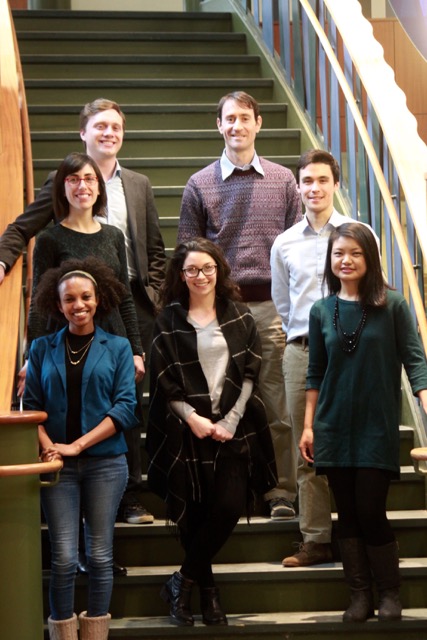About This Project
Our nation is experiencing a rise in public xenophobia and hate crimes, with people of color and immigrants being the victims of this crisis. We believe that college students of color are especially vulnerable to this hate and subsequent mental health outcomes. Therefore, we seek to use our survey--fielded at over 125 colleges and universities, with over 150,000 survey respondents--to understand students of color's current mental health, and help schools protect their students.
Ask the Scientists
Join The DiscussionWhat is the context of this research?
Early reports indicate a recent rise in hate crimes across the U.S. Similar to Brexit in the U.K., these crimes are usually based in xenophobic, and even white-supremacist, sentiment. People of color have been significant victims of these crimes.
Past research indicates college students of color are subject to relatively-high incidences of discrimination, and that this discrimination results in poor mental health. However, research is extremely lacking, with almost no current studies since the 2015-spike in hate crimes and rhetoric.
Given students of color's vulnerability, it is crucial to understand how and why their mental health may differ in our current social-climate, in order to identify how schools may help those in need.
What is the significance of this project?
As mentioned in the Context of this project, students of color's vulnerability to the adverse mental health effects of discrimination may increase during this current period of xenophobic rhetoric and crime, but there has yet to be a study to examine this potential issue.
Given its extensive validation and infrastructure, our Healthy Minds Study survey is a uniquely qualified tool to assess this problem, quickly. Our open data-sharing policy helps campuses make informed decisions to protect their students. Moreover, we are networked with multiple partners that work with schools to better their mental health climate.
Our significance comes not only from addressing the lack of research, but also our ability to conduct and translate the research into an actionable resource.
What are the goals of the project?
Our goal is to distribute HMS to at least 2 schools, servicing a large proportion of immigrant and students of color (primarily targeting Hispanic, Arab, and Muslim students), without the available funds to participate in our survey.
We will start the survey by the end of the Winter/Spring 2017 semester, and take 3-4 weeks for data collection. Schools will be given initial data reports immediately following, and a full analysis--including national data comparisons --during the summer of 2017.
Our analyses will examine differential mental health outcomes among students by race/ethnicity, and identify significantly related factors to these outcomes.
Finally, our de-identified data will, as always, be available for the public, in order to inform policy and practice around the U.S.
Budget
As we already have all necessary infrastructure in place, we have no costs associated with start-up resources.
That being said, we do need money to provide incentives, to ensure a sufficient response-rate.
Our greatest expense is paying for our expert-staff's time-effort.
In the spirit of transparency, we have included the platform and payment fees from Experiment.com in our budget, using the 8%-of-budget estimate provided by Experiment (8% of $4,348 is $347.84, resulting in a net of $4,000.16 for schools is we are funded at our minimum goal). We are including this because we know that it will cost a minimum of $2,000 per school to run this project, and thus want every dollar of our base $4,000-goal to go to supporting our schools.
Endorsed by
Meet the Team
Affiliates
Team Bio
Taking a public health approach, HMN focuses on 3 main objectives related to youth's mental health: producing knowledge (research), distributing knowledge (dissemination), and using knowledge (practice).
Utilizing our Healthy Minds Survey, we emphasize understanding service utilization and help-seeking behavior, stigma, knowledge, and the role of peers and other potential gatekeepers, at both the institutional and national levels.
Meet our team here!
Peter Ceglarek
I am a graduate of the University of Michigan’s Department of Psychology (Honors B.S., 2014) and School of Public Health (M.P.H., Health Behaviors and Health Education, 2016), with a long-standing interest in mental health research and promotion among youth. I have worked as a clinical intern for inpatient psychiatry at Kingswood Hospital in Detroit, have published his own research on the mental health impacts of youth’s social networking site use, have helped create web-apps and educational seminars on sexual and mental health for gender and sexual minority youth with the Center for Sexuality and Health Disparities, and have been involved with numerous community and self-directed media projects focusing on youth empowerment. My goal is to promote the development and wide-dissemination of innovative, entertaining, and engaging media to promote youth empowerment, mental health, and social well-being. I assist with the management and coordination of the Healthy Minds Study and other projects with HMN, and am very excited by the Network’s growing success and impact.
Adam Kern
I received my BA in Psychology with honors at the University of Michigan in 2014. I currently work as a study coordinator for the Healthy Minds Network (HMN) at the University of Michigan, and am also involved in the Athletes Connected initiative at the university. I assist with survey distribution, data analysis, event coordination, and communications, but primarily coordinate and administer the Healthy Minds Study (HMS). As a former student-athlete at Michigan who is acutely aware of the mental health challenges that athletes face, I find that the work I am doing both in the Healthy Minds Network and Athletes Connected allows me to fulfill my desire to examine college student mental health and student-athlete mental health.
Sarah Ketchen Lipson
I received my bachelor’s degree from Tufts University where I was awarded best honors thesis of the year and graduated with honors. I also holds a master’s from Harvard University and was a Fulbright scholar. I completed a dual PhD at University of Michigan in 2016 in Health Services Organization and Policy at the School of Public Health and Higher Education at the School of Education. I am now a faculty member at the University of Michigan Medical School in the Child Health Evaluation and Research Center within the Department of Pediatrics. I am also Associate Director of the Healthy Minds Network for Research on Adolescent and Young Adult Mental Health, an international research-to-practice initiative, and co-Principal Investigator of the Healthy Minds Study. My research focuses primarily on mental health and service utilization in college populations. My long-term goal is to improve mental health on college campuses through early intervention and prevention efforts. I employ varied methodologies, including large-scale epidemiological surveys and population-level interventions.
Daniel Eisenberg
I am a Professor of Health Management and Policy in the School of Public Health at the University of Michigan, where I am also affiliated with the Population Studies Center and the Comprehensive Depression Center. My training is in economics (Ph.D., Stanford University) and mental health services research (NIMH Postdoctoral Traineeship, UC-Berkeley). My broad research goal is to improve understanding of how to invest effectively in the mental health of young people, particularly college students. I direct the Healthy Minds Network (HMN) for Research on Adolescent and Young Adult Mental Health (www.healthymindsnetwork.org). HMN's projects include the Healthy Minds Survey as well as technology and media-based interventions.
Additional Information
More info on the Healthy Minds Study (HMS)
A list of participating schools in HMS
HMS data-reports
A list of HMN publications
A list of HMN's free, public webinars on mental health
HMN's free, public, annual Research Symposium
A list of HMN's partners
HMN's other projects
More readings related to this current project: Attributes and incidents of hate crimes (1, 2, 3, 4, 5, 6, 7, 8); Mental health among young people of color (1, 2, 3, 4, 5, 6, 7, 8, 9, 10); Effects of Brexit on hate-crimes and culture in the U.K. and E.U. (1, 2, 3, 4, 5, 6, 7).
Like us on Facebook, and follow us on Twitter!

Project Backers
- 33Backers
- 51%Funded
- $2,197Total Donations
- $64.62Average Donation






